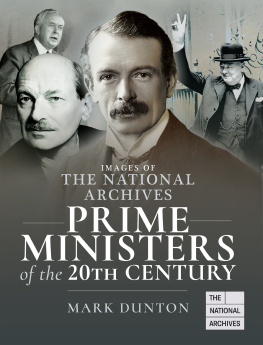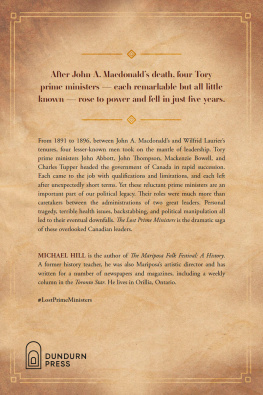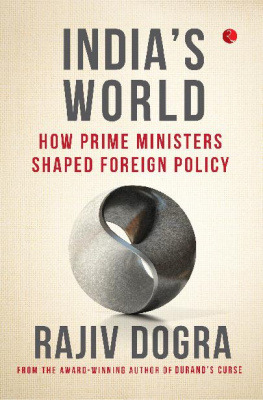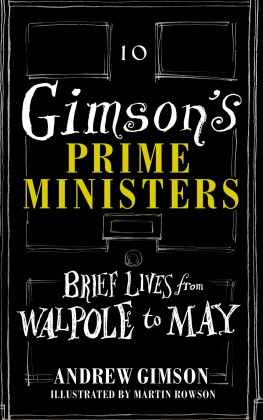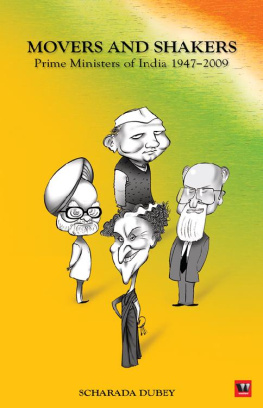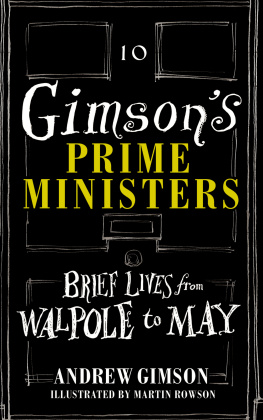Pagebreaks of the print version

IMAGES OF THE NATIONAL ARCHIVES
PRIME MINISTERS
OF THE
20TH CENTURY
Dedicated to the memory of John Nugent Dunton
IMAGES OF THE NATIONAL ARCHIVES
PRIME MINISTERS
OF THE
20TH CENTURY
MARK DUNTON
First published in Great Britain in 2021 by
Pen and Sword History
An imprint of
Pen & Sword Books Ltd
Yorkshire - Philadelphia
Copyright Mark Dunton, 2021
ISBN 978 1 52672 949 1
ePUB ISBN 978 1 5267 2950 7
Mobi ISBN 978 1 5267 2951 4
The right of Mark Dunton to be identified as the author of this work has been asserted by him in accordance with the Copyright, Designs and Patents Act 1988.
A CIP catalogue record for this book is available from the British Library.
The National Archives logo device is a trade mark of The National Archives and is used under licence. The National Archives logo Crown Copyright 2018 Crown Copyright images reproduced by permission of The National Archives, London England, 2018. The National Archives is the official archives and publisher for the UK Government, and for England and Wales. We work to bring together and secure the future of the public record, both digital and physical, for future generations. The National Archives is open to all, offering a range of activities and spaces to enjoy, as well as our reading rooms for research. Many of our most popular records are also available online.
All rights reserved. No part of this book may be reproduced or transmitted in any form or by any means, electronic or mechanical including photocopying, recording or by any information storage and retrieval system, without permission from the Publisher in writing.
Pen & Sword Books Ltd incorporates the Imprints of Pen & Sword Books Archaeology, Atlas, Aviation, Battleground, Discovery, Family History, History, Maritime, Military, Naval, Politics, Railways, Select, Transport, True Crime, Fiction, Frontline Books, Leo Cooper, Praetorian Press, Seaforth Publishing, Wharncliffe and White Owl.
For a complete list of Pen & Sword titles please contact
PEN & SWORD BOOKS LIMITED
47 Church Street, Barnsley, South Yorkshire, S70 2AS, England
E-mail:
Website: www.pen-and-sword.co.uk
or
PEN AND SWORD BOOKS
1950 Lawrence Rd, Havertown, PA 19083, USA
E-mail:
Website: www.penandswordbooks.com
ACKNOWLEDGEMENTS
I would like to thank Mark Pearsall and Dr Stephen Twigge for their helpful advice during the drafting process. I would also like to thank Ela Kaczmarska, Publishing Executive at The National Archives, and Aileen Pringle, Carol Trow and Janet Brookes of Pen & Sword, for all they have done to make this book possible.
Mark Dunton, April 2020
INTRODUCTION
The Prime Minister is at the apex of power in government. He or she has ultimate responsibility for governmental decisions, chairs the Cabinet, drives the political agenda, and appoints and dismisses ministers. The Prime Minister also advises the Sovereign when Parliament should be dissolved and a general election held.
By common consensus, the first of the line was Sir Robert Walpole, who served from 1721 to 1742, but the title of Prime Minister was not acknowledged formally until 1878. The powers and duties of the role are not defined by any statute; the office of Prime Minister has evolved over time, accruing new functions, customs and conventions. Herbert Asquith declared that the office is what its holder chooses and is able to make of it.
The wisdom of Asquiths dictum becomes apparent as you peruse the history of the individual Prime Ministers. The variety of personalities who have held this office in the twentieth century is striking. Very neatly there are twenty (some had more than one premiership). Images of documents from The National Archives give insights into their characters, how they projected themselves, and the formidable challenges they faced. Some were unlucky; others made their own luck.
In many ways, for all the prestige associated with the role, it is an unenviable job, subject to huge pressures, and this selection of documents show our Prime Ministers grappling with all manner of problems. All is not angst and frustration, however; there are instances where wit is deployed to great effect.
As well as the decline of the British Empire, the twentieth century saw two world wars and the development of the welfare state. Government acquired a greater role in national life, and this was reflected in the importance of the Prime Ministerial role. Party considerations also became increasingly important, and the way that the public perceived a government became bound up with the performance of its Prime Minister. The names of the Prime Ministers of the twentieth century are the chapter headings of Britains modern history.
ROBERT GASCOYNE-CECIL, 3RD MARQUESS OF SALISBURY
Born: 3 February 1830
Died: 22 August 1903
Dates in Office: 23 June 1885 28 January 1886
25 July 1886 11 August 1892
25 June 1895 11 July 1902
Party: Conservative

The Marquis of Salisbury, 1887. COPY 1/77
You might be tempted to assume that Lord Salisbury, a figure from a privileged background who rose to the pinnacle of political power, had a charmed and gilded life. But look at this image of Lord Salisbury around the age of 57, and what do you see? There is a melancholy look in his eyes: he gives an impression of vulnerability and great seriousness. What lay behind this aura of sadness?
As a boy, Robert Cecil loved books and subjects such as botany, theology and the sciences. He had a lonely childhood with few friends and occupied himself with reading. He disliked sports and had no interest in traditional country pursuits such as shooting. At the age of eleven, Cecil went to Eton College. His sensitive, bookish and intellectual nature set him apart from other boys, and he was subjected to ferocious bullying, to such an extent that, with his mental and physical health close to collapse, his father withdrew him from the school at the age of fifteen.
Lord Salisburys troubled passage to adulthood marked him for life. Through his experiences, Cecil developed a very pessimistic view of human nature and the cruelty of the mob. This outlook helps to explain his opposition to the Second Reform Bill (the Reform Act of 1867), which enfranchised the majority of men who lived in urban areas in England and Wales.
Dislike of mob mentality also helps to explain his disdain for jingoism. Although the British Empire expanded massively during his premierships, he has been referred to as a reluctant imperialist. While his final premiership saw the intensely bitter and bloody Boer War in South Africa, he managed to bring this to a generally acceptable conclusion on 31 May 1902.
The Relief of Mafeking in South Africa is announced in this Daily Telegraph billboard in Trafalgar Square, London on 19 May 1900 (see page 10). The British garrison at Mafeking, numbering about 2,000 and led by Colonel Robert Baden-Powell, had been under siege for seven months by a 5,000-strong Boer force. The news that the siege was broken gave a great morale boost to the British after earlier military disasters.

